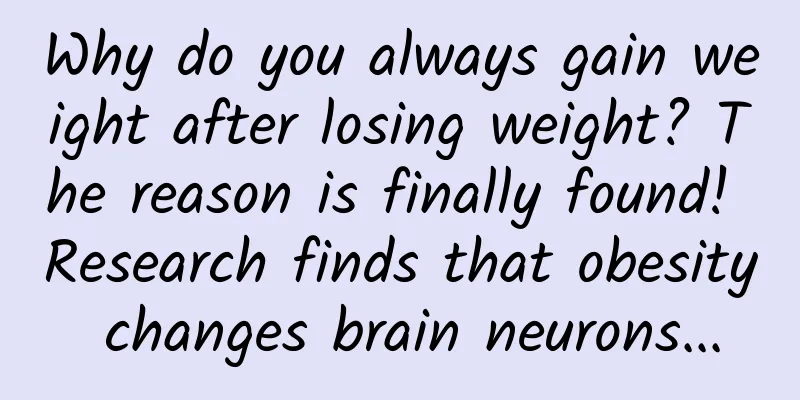Why do you always gain weight after losing weight? The reason is finally found! Research finds that obesity changes brain neurons...

|
Today (March 4) is World Obesity Day. Obesity is a global public health issue, defined by the World Health Organization as the world's largest chronic disease. It is associated with the incidence of many diseases such as cancer, cardiovascular disease, diabetes, and is also related to mental health problems such as anxiety and depression. Therefore, it is urgent to conduct in-depth research on the pathogenic mechanism of obesity and to prevent and intervene in obesity. When faced with the temptation of delicious food, individuals with weaker control will overeat, which will eventually lead to obesity. On the other hand, individuals with stronger control will eat reasonably and maintain a healthy weight. So, how does the human body control its appetite? Why do some people easily rebound after losing weight? Many researchers are studying this mechanism. Copyright images in the gallery. Reprinting and using them may lead to copyright disputes. How the obese brain responds to food Was destroyed On June 12, 2023, Dr. Mireille J. Serlie's team from the University of Amsterdam Medical Center in the Netherlands and Dr. Ralph J. DiLeone's team from the Yale University School of Medicine in the United States published a research paper titled "Brain responses to nutrients are severely impaired and not reversed by weight loss in humans with obesity: a randomized crossover study" in Nature Metabolism, a Nature subsidiary journal. The paper conducted relevant clinical trials on the brain response issues in patients with obesity. Why do I gain weight back after losing weight? Researchers tell you the answer. The research team recruited 60 volunteers to participate in this clinical trial. Among these 60 volunteers, 30 were obese individuals with a BMI (body mass index, BMI=weight ÷ height²) exceeding 30, and the other 30 were normal weight individuals with a BMI between 18.5 and 25. The researchers used feeding tubes to deliver two types of food (a glucose solution and a lipid solution) directly into the volunteers' stomachs, and then used functional magnetic resonance imaging (fMRI) to examine how their brains responded to these foods. The reason why the volunteers were not allowed to eat delicious food in a normal way, but instead sugar and fat were fed directly into the stomach through a feeding tube, was to avoid the interference of the sensory effects of food on brain activity. In their experiments they found that: Normal-weight individuals: After consuming sugar and fat, several areas of the brain responsible for hunger regulation showed reduced activity, which can be interpreted as a reduced desire to eat further; Obese individuals: After consuming sugar and fat, there was no detectable difference in activity levels in several areas of the brain responsible for hunger regulation before and after consumption, and their desire to eat further was not reduced. The author of the paper, Dr. Mireille Celli, said they were surprised by this because they had expected that the brains of obese people and people of normal weight would respond differently after consuming food, but they did not expect that the brains of obese people would have no response at all. The researchers also conducted a further experiment, in which they asked these obese volunteers to lose weight first, spending 12 weeks to lose at least 10% of their body weight. After 12 weeks, they repeated the experiment. The results showed that even after losing weight, their brains behaved similarly after eating as before losing weight. After consuming sugar and fat, the activity of several areas of the brain responsible for hunger regulation remained unabated, and the desire to eat further did not decrease. This means that the brain's response to food is disrupted in obese individuals compared to normal-weight individuals, and this negative effect is not reversed even when the weight is lost. This also explains from one perspective why many people find it difficult to succeed in losing weight, because after they lose weight, their appetite remains big and their weight quickly rebounds. It seems that "controlling your mouth" is the most difficult thing. Copyright images in the gallery, reprinting and using may cause copyright disputes It should be noted that this study has two limitations: 1. The researchers conducted fMRI examinations within about 30 minutes after the volunteers were given sugar and fat. Although no response was detected in the brains of obese individuals at this time point, it cannot be ruled out that the brain responded after this time point, that is, it cannot be ruled out that the response was only delayed rather than completely eliminated; 2. The volunteers who participated in the trial were all over 40 years old, but will the trial results be the same for young people under 40 years old? The obese brain Failure to release dopamine normally In addition, the researchers conducted further research. Scientists have long been studying how humans can or cannot control their appetite. It is generally believed that the sensory pleasure brought by the color, aroma and taste of food is the main cause of overeating in some people. However, more and more studies have shown that the response of the brain's related areas that control hunger and satiety after an individual eats also plays an important role in regulating the individual's eating behavior. In 2012, a study on rodents found that consuming carbohydrates and fats stimulates the release of dopamine in an area of the brain called the striatum, which produces pleasure and satisfaction from eating. The striatum plays a vital role in regulating eating behavior, and long-term intake of high-fat foods that cause obesity may inhibit the response of the striatum. The authors of the paper reported in this article further studied whether obesity can lead to a sluggish response in the striatum of the brain. The authors used single-photon emission computed tomography (SPECT) to detect the release of dopamine in the striatum of the brain. They found that although the striatum of obese people would release dopamine normally after the infusion of glucose solution, the striatum of obese people could not release dopamine normally after the infusion of lipid solution; and after the obese people successfully lost weight, they could not restore normal dopamine release. This finding further suggests that the brain's response to food is indeed damaged in obese people, which may cause obese people to overeat and easily regain weight after losing weight. Rebounding is not a reason to give up losing weight! Copyrighted images from the gallery, reprinting and using may cause copyright disputes In summary, the results obtained from this study provide new insights into the physiology of human eating behavior and the pathophysiology of obesity, and provide a theoretical basis for the future development of weight loss therapies for obese people. Obesity prevention and control Should be throughout the life cycle of a person Since "obesity once changes the brain for life and makes weight loss easy to rebound", and obesity is closely related to a variety of diseases throughout the body, preventing obesity and maintaining a healthy weight are issues that each of us needs to pay persistent attention to throughout our lives. 1.What are the healthy weight standards for different groups of people? According to the recommendations of the "Dietary Guidelines for Chinese Residents (2022)", the normal BMI range for healthy adults in my country (18-64 years old) is 18.5-23.9. A BMI of more than 24 is considered overweight, and a BMI of more than 28 is considered obese. The weight and BMI of the elderly over 65 years old can be slightly higher. Children and adolescents aged 6-18 can use the BMI standards of different genders and ages provided in the "Overweight and Obesity Screening for School-Age Children and Adolescents" to make judgments. Swipe up and down to see more The picture is taken from the health industry standard of the People's Republic of China "Screening for overweight and obesity in school-age children and adolescents" 2. How to maintain a healthy weight? Obesity is essentially the result of the accumulation of excess energy intake over time. Therefore, when preventing obesity and maintaining a healthy weight, "eating right" and "exercising the right amount" are the two most important aspects. In terms of "eating": We must adhere to the principles of "balanced diet" and "not overeating". According to the structure of the "Balanced Diet Pagoda for Chinese Residents (2022)", we can reasonably balance and match cereals and tubers, vegetables and fruits, animal foods, soybeans and nuts, cooking oil and salt, and control the total intake. In terms of "movement": For children and adolescents aged 6 to 17: It is recommended to carry out at least 60 minutes of moderate to high intensity physical activity every day, and outdoor activities are encouraged. Carry out muscle strength training more than 3 times a week. Reduce static behaviors such as sitting and lying down. Each static behavior should not last more than 1 hour, and the cumulative screen time per day should be less than 2 hours. For adults aged 18 to 64: It is recommended to perform 150 to 300 minutes of moderate-intensity or 75 to 150 minutes of high-intensity aerobic activity per week, or a combination of equal amounts of moderate-intensity and high-intensity aerobic activity, and perform muscle strength training more than 2 times a week. The prevention and control of obesity should be carried out throughout the life cycle of a person, and requires the joint efforts of the government, society, families and individuals. It is recommended that the whole society pay attention to health issues and form the concept of healthy living. Attention should be paid to this issue from the pre-pregnancy period and pregnancy period. Obesity should be prevented and controlled from the infant, childhood, and adolescence period. In adulthood, more attention should be paid to the balance between eating and exercise to maintain a healthy weight. Finally, I wish everyone a healthy body! References [1] van Galen, KA, Schrantee, A., ter Horst, KW et al. Brain responses to nutrients are severely impaired and not reversed by weight loss in humans with obesity: a randomized crossover study. Nat Metab 5, 1059–1072 (2023). https://doi.org/10.1038/s42255-023-00816-9[2] Blundell JE, King NA. Overconsumption as a Cause of Weight Gain: Behavioral–Physiological Interactions in the Control of Food Intake (Appetite): Ciba Foundation Symposium 201 - The Origins and Consequences of Obesity.[3] Berthoud HR. Mind versus metabolism in the control of food intake and energy balance. Physiol Behav. 2004;81(5):781-93.[4] Reyes TM. High-fat diet alters the dopamine and opioid systems: effects across development. Int J Obes Suppl. 2012;2(Suppl 2):S25-8. Author: Zeng Xinyue, popular science creator Reviewer: Tao Ning, Associate Researcher, Institute of Biophysics, Chinese Academy of Sciences |
Recommend
I asked the programmer goddess for her QQ number, but...
introduction A beautiful programmer came to our t...
Caixuetang's "Stock Market Trend Trading Method 1+2+3" deciphers the main trading techniques and gives you the supreme strategy system
Caixuetang's "Stock Market Trend Trading...
Where does carbon come from? Ancient plants that look like chocolate cones give the answer →
As a common fossil energy, coal produces a large ...
[Must-have course for moms] 20 lessons on children's nutrition: Raise healthy and smart children easily
[Must-have course for moms] 20 lessons on childre...
Do you prefer strong or weak cooling when taking the subway?
Against the backdrop of rapid development of mode...
Why did Steve Jobs forbid his children from using iPads at home?
Although Apple invented the iPad, as one of the im...
WordPress website (relocation) moving tutorial
WordPress website (relocation) moving tutorial Mo...
I am a terrifying snake, but I am about to become a meal! | Expo Daily
Snake, I'm about to become a meal Environment...
Now that The Pirate Bay is shut down, will the era of free movie watching be gone forever?
On December 12, according to foreign media report...
When will Changchun be unsealed in 2022? When will the closed community be lifted? Attached is the query method!
Recently, the number of new nucleic acid-positive...
Windows 10 is best with 8GB of RAM
It is an absolute truth that more memory can impr...
What is the effect of placing large-scale advertisements with internet celebrities? Here is the first influencer marketing analysis report and five cases!
This article contains some useful information , b...
These Beijing alleys are full of celebrity stories
Beijing's hutongs were formed in the Yuan Dyn...
2019 Advertising Monetization Insights Report!
In this article, we will continue to provide you ...
What is the correct approach for online novels to go overseas?
As China's Internet overseas expansion has en...

![Zhuorang Xianyu Xiaobai five-day training camp, one hour a day, make money easily and faster [video course]](/upload/images/67cc288bd88d5.webp)







